
Innovative Earning Through AI: How Sika Moon’s Virtual Avatar Generates $20K Monthly
The emergence of artificial intelligence has revolutionized numerous fields, ranging from education and the workplace to science and entertainment. This technology has now made it possible for individuals to create digital doubles of themselves, unlocking new economic opportunities.
Sika Moon, a 28-year-old model from Berlin, serves as a striking example. She has employed artificial intelligence to develop a virtual counterpart that engages with her online audience. “I used AI to create the woman I’ve always dreamt of being, and this digital version of me generates $20,000 a month,” Moon states.
Remarkably, Moon’s digital persona has attracted more attention than her own, despite her five years in the modeling industry. She is now among the top one percent of earners on Fanvue, a UK-based platform akin to OnlyFans, where creators can earn money from their content through images and videos.
“SHE IS A PART OF ME”

After spending five years in the adult entertainment industry, Sika Moon yearned for a shift. Weary of the routine and the stifling of creativity, she turned her attention to the realm of AI-powered art. “I re-entered the artistic domain, intrigued by the limitless potential of creating art with AI. I decided to digitally recreate myself, embodying the ideal version of the woman I’ve always aspired to be—forever young, beautiful, smart, and distinctive,” Sika recounts.
Sika views her virtual alter ego as more than a mere simulation; it’s an extension of her identity. “She’s a part of me, which I love! My fans understand that she’s akin to me, not just some chatbot or a creation by an agency,” she remarks.
Fanvue offers a subscription model priced at $10.99 per month, granting users the opportunity to interact with and enjoy content from Sika’s digital counterpart.
This innovation is part of a broader movement towards AI-generated virtual companions. The AI sector is witnessing exponential growth, with thousands of virtual personas making their mark on platforms like Instagram, TikTok, and Twitter. These digital entities cater to various unfulfilled needs, often serving as a surrogate for real human interaction where it is lacking. “We’re truly at the beginning of the AI creative economy,” Sika observes.
Influencers like Sika are leveraging platforms such as ‘Anydream’ to create their digital selves. This platform employs photography and text prompts to produce highly realistic renditions of characters, irrespective of gender.
EXPERTS ARE WORRIED

While the appeal of AI-generated virtual personas is unmistakable, experts urge caution in their uncritical acceptance. Psychologist Dr. Catherine Hallissey emphasizes the ethical issues that developers should consider, especially regarding the promotion of unrealistic beauty standards:
“Digital avatars often exhibit exaggerated, flawless characteristics that establish an unattainable standard of beauty. Such comparisons can have harmful effects on self-esteem and body image for individuals who view themselves negatively against these impossible ideals. For some, these unrealistic representations can exacerbate feelings of inadequacy and even contribute to body dysmorphia,” Dr. Hallissey cautions.
As AI technology advances and becomes more integrated into various sectors, the conversation around its ethical ramifications, particularly those affecting body image and self-perception, gains relevance.
You may also like this content
- What Is the Multiverse?
- Similarities and Differences Between the Multiverse and the Metaverse
- Predictions for the Future of the Metaverse Concept
Follow us on TWITTER (X) and be instantly informed about the latest developments…












